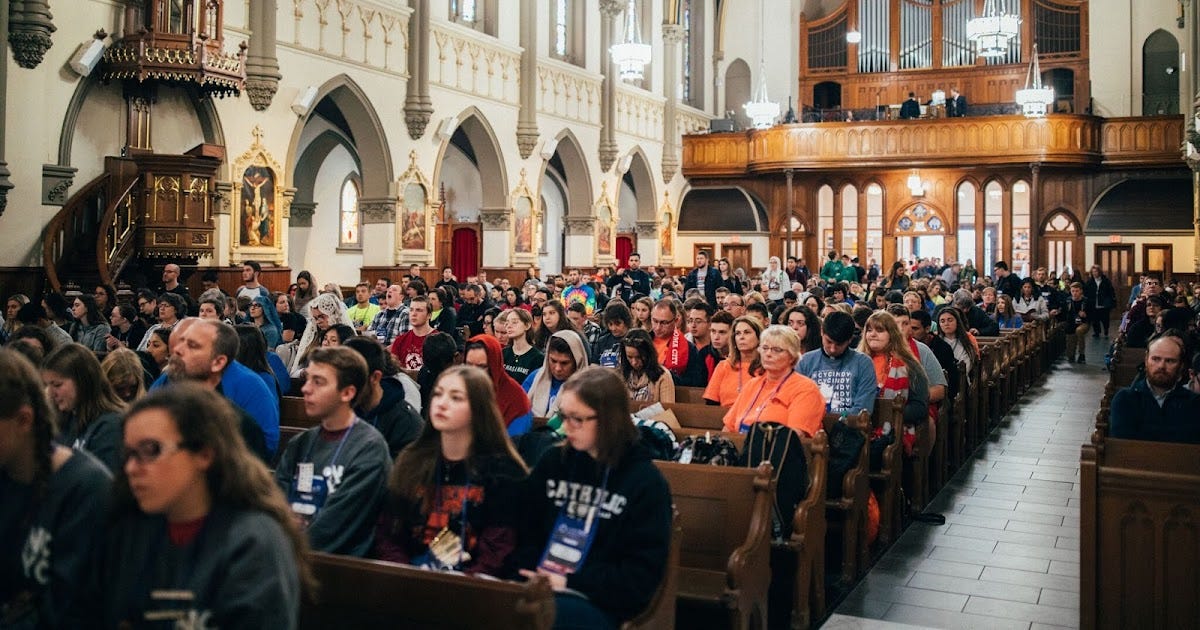"You have to understand how hard it was to convert back then."
You’ve heard the statistic, “8 people leave the Catholic Church for every 1 who joins.”
It’s real, and it’s worth some concern. But if that’s all you focus on, you’re missing what’s actually happening in the American Church right now.
Catholics today have become experts at cynicism. We love to complain about bureaucracy, bad music, mediocre preaching, and cradle Catholics who leave. We obsess over scandals and empty pews.
And obviously, some of that criticism is legitimate. Your parish liturgy might actually be garbage. Your diocese might be bureaucratic. Those problems exist.
But we’ve gotten so good at identifying what’s wrong that we’ve become blind to what’s going right.
I was talking to one of my professors about his conversion to Catholicism in the 1980s. He said, “Pat, you have to understand how hard it was to convert back then.”
If you wanted to become Catholic, you had to really want it. You had to hunt down esoteric books on theology and figure it out yourself.
In the ’80s and ‘90s, there was no Catholic Answers. No Father Mike Schmitz. No Bible in a Year. Scott Hahn had just converted. The Catechism of the Catholic Church was only released in English in 1994.
Today we have an embarrassment of riches.
FOCUS, Life Teen, Word on Fire, Hallow, Ascension Press, Catholic Answers, Steubenville conferences. Throw a rock in any young Catholic and you’ll hit someone who owes their faith to one of these organizations.
These institutions didn’t exist 40 years ago. Now they’re everywhere, and they’re working together to build up different facets of our faith. We’re reaching people in ways we never could before. And it’s starting to turn the tide.
Here’s the proper sober analysis of the Church in America (neither pessimistic or overly optimistic)
50 years ago, we were hemorrhaging people faster than we could count, adding nobody.
Toda,y we are stopping the bleed and turning things around
50 years from now, we will be stronger than we were before.
Gen Z is more religious than their parents. OCIA numbers are climbing in parishes across the country. Catholicism is a relevant force in American political life. These things weren’t happening 20 years ago.
Our grandchildren won’t understand what we’re talking about when we tell them “eight people left for every one who joined.” Our great-grandchildren will laugh at the idea that the Catholic Church in America ever shrank.
That’s how successful we’re going to be.
So it’s fine to acknowledge the problems in the Church as long as you remember that other parts are thriving. When you’re tempted to complain about the state of the Church, remember the people and communities that are succeeding.
The New Evangelization is working.
The Holy Spirit is moving.
We are winning.




I’m afraid I can’t condone this article on the state of the Church because it didn’t give me an adrenaline spike of anger
I was just thinking about how we're really lacking hope in the trad community. And without hope, you'll always be strapped for energy, which will destroy your reason for hope..
So, thanks! Great article.